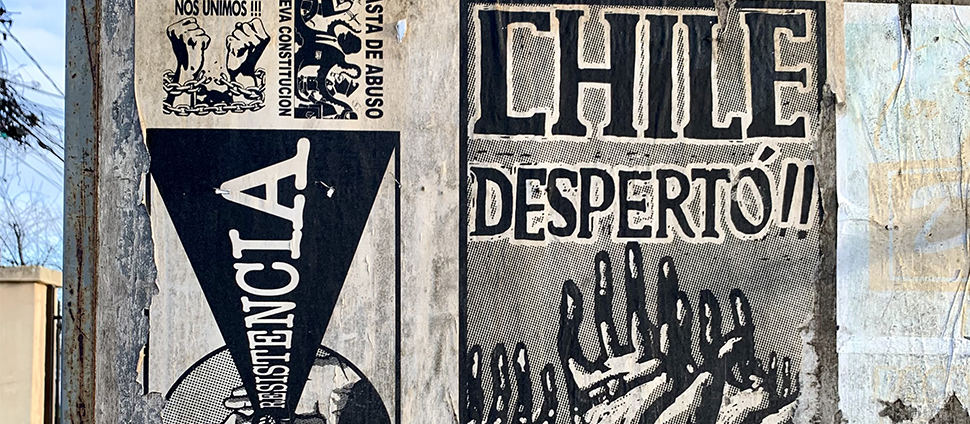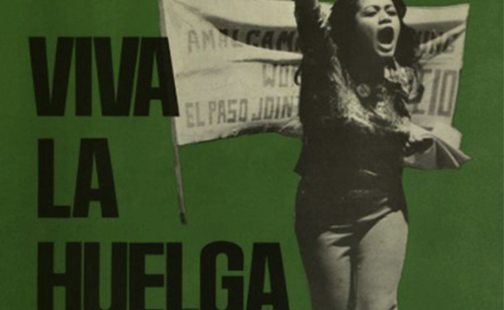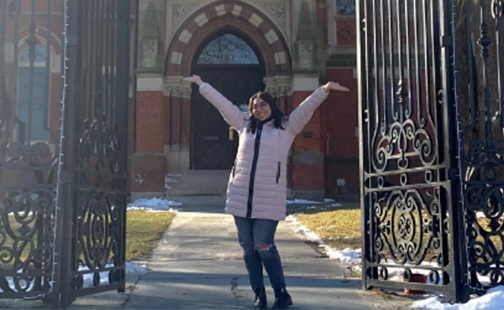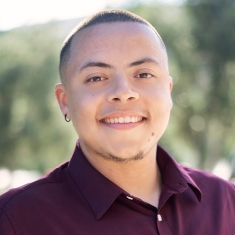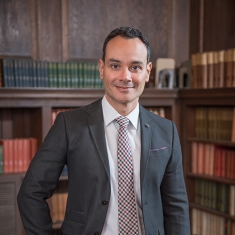The interdisciplinary program of Latin American & Latino/a Studies (LALS) fosters a rich and critical understanding of Latin America, including Brazil and the Hispanic Caribbean, in its broadest sense. The program focuses on the cultural production, history and political, social and economic structures created by the inhabitants of the area extending from Mexico to Tierra del Fuego, from California to Cuba, and in dialogue with the rest of the world. Students explore the diversity that existed in Latin America before the arrival of Europeans, the societies that subsequently developed among Native Americans, Europeans, Asians and Africans, and contemporary issues and forms of expression both of Latin Americans and of Latinas/os in the United States.
Announcements
Best Article Prize from the Association of Latin American Art
Congratulations to Professor Dana Leibsohn, whose essay “Lost and Found at Sea, or a Shipwreck’s Art History,” co-authored with Aaron Hyman and published on West 86th, has received the Best Article Prize from the Association of Latin American Art.
The LALS Program has four primary goals for its students:
- To understand Latin America and Latinos in the United States through the lenses of literature, the arts and the social sciences.
- To investigate the specific historical conditions that have shaped—and continue to shape—these societies.
- To develop communication skills in Spanish and/or Portuguese.
- To further knowledge of the unique ways in which visual culture, literature, artistic production, history, politics and economics intertwine for present-day people who consider themselves Latin Americans.
These goals focus our curriculum to prepare majors to successfully attain essential capacities, with particular strengths in developing historical and comparative perspectives through the study of the development of societies, cultures and philosophies; the study of languages; and the understanding of multi- and interdisciplinary approaches. Likewise, the program curriculum fosters the development of informed global citizens with its fundamental commitment to engaging with communities beyond Smith, domestically and internationally, and its attention to the regional and global challenges of ethnic and racial diversity, as well as gender, environmental and social justice.
The curriculum is attentive to the development of critical and analytical thinking skills and the cultivation of the skills necessary to convey information and understanding. Students develop close reading, clear speaking and writing skills, most explicitly but not exclusively in literature and history courses. Course offerings in the humanities create opportunities for creative expression, in written as well as visual media and performance, and those in the social sciences develop the necessary skills to evaluate and present evidence accurately, verbally and in writing. Community-based research courses and public scholarship -oriented research projects provide opportunities for students to work collaboratively and to reflect critically on the collaborative process.
The major (10 courses, 40 credits) builds upon core interdisciplinary work in Latin American Studies and centers a commitment to the study of Spanish and/or Portuguese. Building on the strength of the core, students will follow a program of studies related to Spanish America and/or Brazil from the disciplines of anthropology, art, dance, economics government, history literature, sociology and theater, through courses offered in affiliated departments and programs. Given the importance of Latino/a studies within the field of Latin American Studies, majors are required to take at least one course in this field. LALS emphasizes student-adviser mentoring partnerships to chart an appropriate curricular path through the major based on students' academic and co-curricular interests.
Basis
- LAS 150
- Other core requirements: LAS 250 and LAS 310: Capstone
Requirements
All students must also complete seven electives:
two humanities courses (e.g., literary studies, historical studies, cultural studies) in Spanish or Portuguese; normally these will be at the 200-level [8 credits]
- Two courses in the social sciences (e.g., Sociology, Anthropology, Government, Economics); normally these will be at the 200-level [8 credits]
- One historically-focused class on Latin America (e.g., a course that considers Indigenous, Black and/or other histories of Latin America across a long durée, a temporal stretch that extends beyond 1950-present); normally at the 200 level [4 credits]
- One course that focuses on the arts in/of Latin America (Art History, Film Studies, Theater, Dance); normally this will be at the 200-level [4 credits]
- One course on Latin America at the 300-level; this class may be in any discipline [4 credits]
Of these seven courses, at least one must focus on the period before Independence (e.g., pre-1825) and one must focus on Latino/a studies.
To build coherence across this range of classes, we expect students to work with their major advisers, choosing their seven courses to develop an intellectual focus. Such foci may be:
- Thematic (e.g., Race/Diaspora, Indigeneity, Gender/Sexuality, Latinidades, Migration/Immigration)
- Geographic (e.g., National, Transborder/border Studies, Regional)
- Temporal (e.g., pre-1825, 19th/20th century, contemporary)
The minor in Latino/a studies consists of six semester-long courses (24 credits). This minor emphasizes key intellectual and methodological capacities for Latino/a Studies: exposure to the shared, transnational histories of Latin and Latino/a America; critical engagement with Spanish as a language of thought and cultural production; a shared, intellectual and interdisciplinary experience with a community of majors and minors in the program.
The S/U grading option is not allowed for courses counting towards the minor, except for these (pandemic) exceptions: any relevant classes taken in the spring of 2020, which were graded S/U by the College, will count towards the minor; students may also count up to two classes towards the major S/U, if thoses classes wre taken in the 2020-2021 academic year.
All students must complete three core courses:
- One course in the history of Latin America and/or the Caribbean (e.g., a course that considers Indigenous, Black and/or other histories of Latin America across a long durée, a temporal stretch that extends beyond 1950-present); normally at the 200 level [4 credits]
- One humanities or cultural communication course in Spanish (normally at the 200-level)
- LAS 310: Capstone
All students must also complete three Latino/a-focused courses that fulfill these distribution requirements:
• At least one course in the social sciences, normally at the 200-level (ANT, ECO, GOV, SOC, HST)
• At least one course in the humanities/arts, normally at the 200-level (ARH, CLT, DAN, ENG, SPN, THE)
Students may count one course in Latino/a studies from another Five College institution toward the minor.
Honors Director: Michelle Joffroy (2023–24)
Please consult the director of honors for specific requirements and application procedures. More information about honors is available on the class deans website.
Requirements
Admission by permission of the Latin American and Latino/a Studies Committee.
- The same as those for the major.
- Thesis proposal, preferably prepared during the second semester of the student's junior year and submitted for consideration no later than the end of the first week of classes the following September.
- A thesis and an oral examination on the thesis.
LAS 430d Thesis
Credits: 8 (yearlong course); offered each year
LAS 431 Thesis
Credits: 8; offered each fall
Students can choose from approximately 30 courses on Latin America offered every year by the departments of art, comparative literature, dance, government, history, sociology and Spanish and Portuguese, as well as from the interdisciplinary courses offered in the Latin American studies program. Fifty or more courses on Latin America are available through the Five College Consortium.
For additional information, please refer to the Smith College Course Search.
LAS 150 Introduction to Latin American and Latino/a/x Studies
Professor Vicente Carrillo
LAS 201of Colloquium: Topics in Latin American and Latino/a Studies
Organizing Freedom – Domestic Worker History and Cultures of Resistance in the Américas
Professor Michelle Joffroy
LAS 201ql Colloquium: Topics in Latin American and Latino/a Studies
Queer Latine Embodiments: Affect, Race, and Aesthetics
Professor Vicente Carrillo
LAS 260 Colloquium: Animal Histories of Latin America
Professor Javier Puente
For additional information, please refer to the Smith College Course Search.
AFR 111 Introduction to Black Culture
Professor Traci-Ann Wint
ANT 223 Caribbean Cultural Thought: The Plantation, Diaspora, and the Popular
Professor Aaron Kamugisha
ARH 201 Brazilian Art Inside and Out
Professor Marguerite I. Harrison
DAN 144 Tango I
Professor Laura Grandi
FYS110 A Century of Revolutions in Latin America
Professor Javier Puente
POR 124 Elementary Portuguese for Spanish Speakers
Professor Malcom McNee
POR 125 Intermediate Portuguese
Professor Simone M. Gugliotta
SOC 350 Seminar: Caribbean Feminisms
Professor Ginetta E.B. Candelario
SPN 200 Intermediate Spanish
Professor Melissa Belmonte
SPN 200 Intermediate Spanish
Professor Adrian A. Gras-Velasquez
SPN 230tm Topics in Latin American and Peninsular Culture and Society
Tales and Images of Travel and Migration in Latin America
Professor Maria Helena Rueda
SPN 245fw Topics in Latin American and Peninsula Studies
Latin American Films Made by Women
Professor Maria Helena Rueda
SPN 246ta The Transpacific Archive of the Americas
Professor Yeongju Lee
SPN 373rw Seminar: Topics in Cultural Movements in Spanish America
Radical Words: Latin American Women and the Struggle for Livable Worlds
Professor Michelle Joffroy
SPN 112y Beginning Spanish
Professor Molly Falsetti-Yu
Studying Latin America at Smith
Emeriti
Velma Garcia
Professor Emerita of Government
Maria Estela Harreteche
Professor Emerita of Spanish and Portuguese
Nancy Saporta Sternbach
Professor Emerita of Spanish
Andrew Zimbalist
Robert A. Woods Professor Emeritus of Economics
Anne Zulawski
Sydenham Clark Parsons Professor Emerita of History and of Latin American Studies
Opportunities & Resources
Study Abroad Opportunities
The Smith College Office for International Study has an extensive list of programs available for students wishing to go abroad. This list changes frequently, so please contact them directly for details.
Study Abroad in Brazil
Advisers: Marguerite Itamar Harrison and Malcolm McNee
See your academic adviser for more opportunities.
Courses at the Five Colleges
Fifty or more Latin American courses are available through the Five College Consortium. More information about studying at the Five Colleges is available on the registrar’s website.
Master’s in Latin American Studies at Georgetown University
Students interested in pursuing graduate studies in LAS have the option of completing a Master of Arts in Latin American studies at Georgetown University in only one extra year and a summer. Those interested must consult with an LAS adviser during their sophomore year or early in their junior year.
Students primarily interested in Latin American literature may wish to consult the major programs available in the Department of Spanish and Portuguese.
Helpful Resources
Latin American & Latino/a Studies Information Literacy Skills
A list of resources related to information literacy skills drafted by faculty, related to Class Guides (below).
Scholarship guide for Hispanic and Latina students
Economic Commission for Latin America and the Caribbean
An excellent resource for up-to-date information about Latin America
LANIC at the University of Texas
An ongoing compilation of many sites in Latin America categorized by country and discipline
Five College Certificate
The Five College Certificate in Latin American, Caribbean, and Latino Studies gives you the opportunity to show an area of specialization in Latin American studies in conjunction with or in addition to your major.
Contact
Dewey House 106
Smith College
Northampton, MA 01063
Email: llettre@smith.edu
Administrative Assistant: Lyndsay Lettre
For questions regarding the Latin American and Latino/a Studies major or minor, please contact chair Javier Puente.

